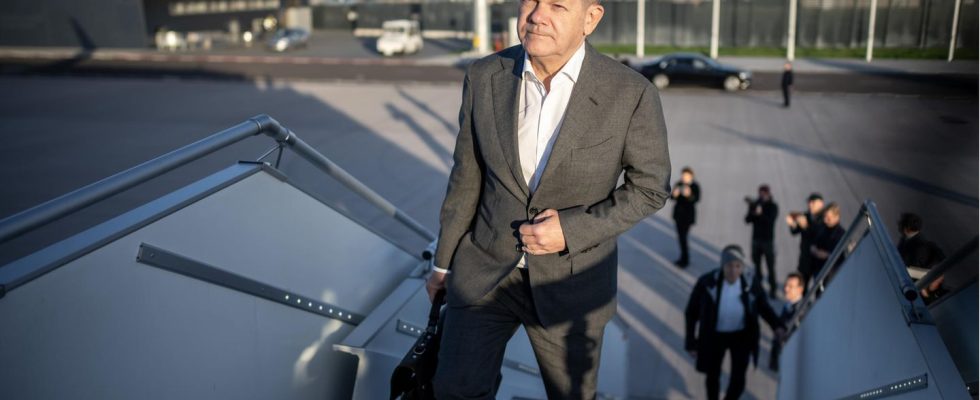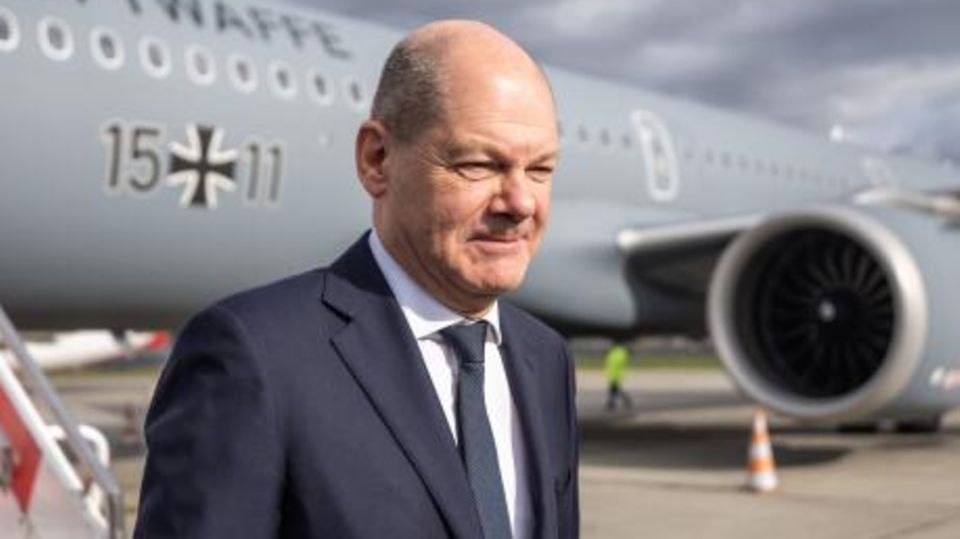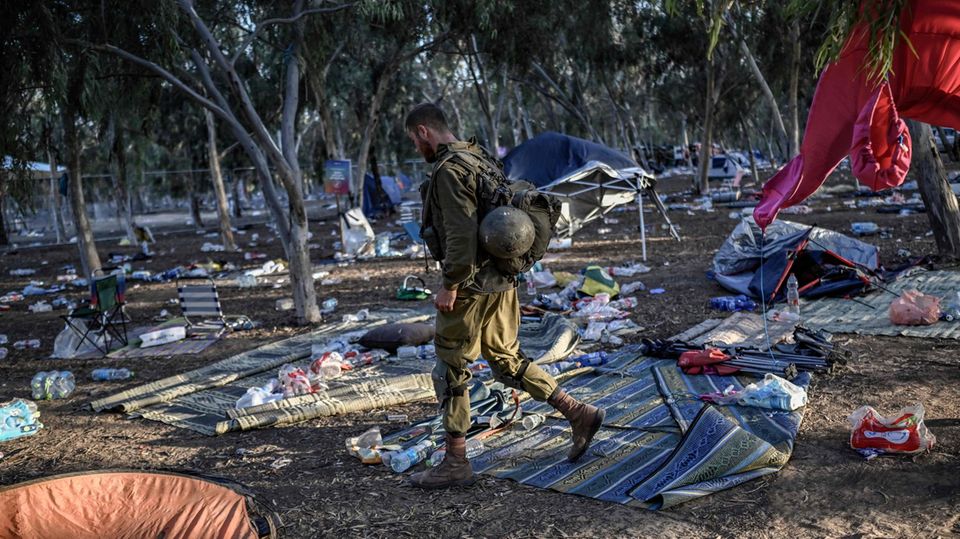In the midst of global crises, Olaf Scholz visits the Western Balkans meeting in Albania. What sounds like a sideshow is actually a hotspot for the EU. But in the background the Chancellor is already planning the next trip.
The Mother Teresa Airport in Tirana. Olaf Scholz gets out of a mouse-gray Air Force A321. Ahead of him lies one of those “Groundhog Day” days that chancellors experience more and more often over the course of their term in office. Days full of things you’ve done before and sentences you’ve said before.
At the end of this day, Scholz, flanked by EU Commission President Ursula von der Leyen, will have spoken again with the heads of government of six Balkan states about ways in which they can become members of the EU. He will have been warmly welcomed by the giant Albanian Prime Minister Edi Rama in front of his official residence. Will have sat through several folkloric dance performances with a motionless expression and will have helped negotiate several regional agreements that are intended to bring them closer to EU standards. He will have warned, encouraged and especially praised the host Albania.
And yet his visit is overshadowed by the major international crises. The war in the Middle East in particular is haunting the Chancellor up to this point. While Scholz is traveling to Tirana, the team is already hectically planning the next trip: On Tuesday, the Chancellor will set off for Israel and Egypt. Mediation mission, the next. It’s about showing solidarity with Israel – but also exploring how humanitarian aid can get to the Gaza Strip.
It’s also about mediation here, in Tirana. Scholz was there once last year. Back then, last December, we met for the Western Balkans summit. This time the meeting is called the “Berlin Process”, a format that Scholz’s predecessor Angela Merkel launched in 2013. Essentially, it’s about keeping those Balkan countries that are not yet in the EU but want to join – Albania, Bosnia and Herzegovina, Kosovo, North Macedonia, Montenegro and Serbia – in line.
They are different distances. The EU is already negotiating accession with Serbia, North Macedonia, Montenegro and Albania. Bosnia-Herzegovina has been an official candidate for membership since December. The furthest behind is Kosovo. It submitted a formal application for membership in December, but has not yet been recognized as an independent state by all EU members and is once again embroiled in tensions with Serbia. Serbia has had accession candidate status since 2012, but continues to alienate its EU partners with President Aleksandar Vučić pointing westward but occasionally turning towards Russia.
Albania has been an official candidate for membership since 2014, and negotiations with the EU began last year. In March, at a reception for Prime Minister Rama in the Chancellery, Scholz called Albania a “role model” for the entire region because it was the first in the region to ratify three agreements reached at the December summit to create a common regional market.
Albania is one of the poorest countries in Europe
The small Balkan state, which is about the size of Brandenburg and has about as many inhabitants as Schleswig-Holstein (2.8 million), urgently needs the prospect of accession. Albania is still considered the “poorhouse of Europe”. The average monthly income is around 650 euros. Only Moldova, Kosovo and Ukraine are poorer. The exodus is so massive that the government just passed a law restricting the departure of doctors. For Albania, the EU perspective is vital to its survival.
But unlike the Hollywood success of Groundhog Day, Scholz doesn’t simply have to have experienced such formats enough times for a happy ending to follow. The war in Ukraine has not only shaken up the world order. It has also caused real concern among those aspiring to join the EU. That the EU could turn away from the actual “offspring” and instead favor the adopted child Ukraine.
Polls in Albania still show support for the EU at 80 percent or more. “However, recently there has been some disillusionment with the slow progress in this process,” says Tobias Rüttershoff, head of the Konrad Adenauer Foundation’s foreign office in Albania. This has become particularly evident since Ukraine and Moldova became candidates for EU membership in June 2022. Albania – unlike the EU candidate Serbia – is clearly positioning itself against the Russian war of aggression.
But we have already gone through a long accession process in which there has been little progress for many years, says the expert Rüttershoff: “Now there is certainly a fear that we, as Albania and as a region, will be forgotten by Europe. This is where we have to think “I would also like to send a clear signal to Germany and the EU that they are continuing to work on EU integration of the Western Balkans and that they offer clear perspectives.”
Almost every second German is against EU expansion
At the moment, Chancellor Scholz can only give such a sign in the form of small gestures such as support for regional agreements and, above all, in the form of warm words. He made the admission of the Western Balkan states one of the major missions of his chancellorship. In Tirana, too, he emphasized once again that it was necessary to accelerate the integration of all Western Balkan countries into the EU.
But the war in Ukraine and the new migration crisis have made the Germans tired of the numerous burdens. Many would see the admission of additional countries into the EU as an imposition.
According to a survey by the European Commission in June, almost one in two people are currently against enlargement of the European Union. Many people strongly associate the Western Balkans with the escape route of large numbers of migrants, the Western Balkan route. A topic that Scholz mainly touched on in bilateral meetings in Tirana.
Disappointed candidates are dangerous for the EU
The Chancellor knows how dangerous it can be for the EU if the candidate countries turn away out of disappointment. The case of Türkiye has shown this.
But Scholz currently has more important things to do than devote all his energy to the question of EU expansion. Hamas’ terrorist attacks have destabilized the Middle East overnight. It’s about the existence of the state of Israel and, for Germany, also about the fact that anti-Semitism in its own country is breaking out on the streets in a bizarre alliance of left, right and Islamists.
Scholz therefore wants to travel to Israel at short notice on Tuesday, after a meeting with the King of Jordan in the morning. Talks are planned with, among others, Israeli Prime Minister Benjamin Netanyahu. On Wednesday we will continue to Egypt. Observers assume that the Israeli ground offensive in Gaza is imminent.
And then there is the war in Ukraine, which continues unabated and continues to trigger new debates in Germany about the possibilities and limits of military aid.
The world has become one of polycrises in which longstanding political certainties suddenly no longer apply. The “Groundhog Day” moments may also be small breaks for the Chancellor to take a breath.



